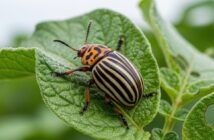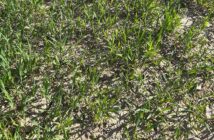Researchers at the University of Hertfordshire have found a way to improve the resilience of oilseed rape and reduce the estimated £100m annual loss* to phoma stem canker, one of the most important winter diseases of oilseed rape in the UK.
Published in Molecular Plant Microbe Interactions, researchers in the Department of Biological and Environmental Science found a previously undetected virus in Leptosphaeria biglobosa, a fungus that causes phoma stem canker in oilseed rape, which can potentially be exploited to improve the immune system of the plant and protect it against more aggressive fungi.
Oilseed rape belongs to the mustard or cabbage family and is a major source of vegetable oil, livestock feed and biodiesel worldwide. Phoma stem canker can be fatal to plants, cutting off their supply to food and water which often leads to premature aging and death.
Dr loly Kotta-Loizou, Visiting Lecturer at the University of Hertfordshire, said: “Our research is setting the groundwork for the biological control of phoma stem canker. What we’ve found can be used as part of an integrated pest management programme aimed at reducing the severity of disease symptoms and improving yield, helping decrease the annual loss to disease every year.”




